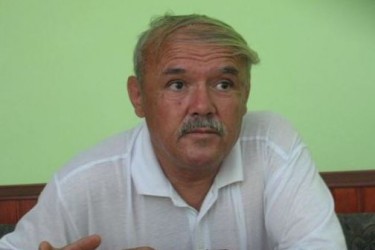
The Disappearance of Tajikistan’s Ethnic Uzbek Leader: A New Stage in the Struggle Between Tashkent and Dushanbe?
Publication: Eurasia Daily Monitor Volume: 10 Issue: 72
By:

Salim Shamsiddinov, a leader of Tajikistan’s ethnic Uzbek community, went missing on March 16. According to Amnesty International, Shamsiddinov’s disappearance could have been a politically motivated abduction. In May of last year, Shamsiddinov was severely beaten by unknown attackers. That attack came after he suggested in a series of interviews with Tajikistani media outlets that certain officials within Tajikistan’s government were pursuing “nationalistic” policies. He had complained that ethnic Uzbeks in Tajikistan lack access to education in their mother tongue. The Uzbek diaspora leader also said that Tajikistan’s President Emomalii Rahmon must change the foreign policy of the country and strengthen its relations with Uzbekistan. The leader of Tajikistan’s opposition Social-Democratic Party, Rahmatillo Zoirov, has argued in front of the media that the disappearance of Shamsiddinov appears to be politically motivated and is connected with Shamsiddinov’s active participation in a lobbying group to change the country’s presidential election law as well as his call for ethnic Uzbeks in Tajikistan to vote for Zoirov in the upcoming presidential elections scheduled for November (fergananews.com, March 27; Amnesty.org, March 26).
Uzbeks are Tajikistan’s largest ethnic minority, making up more than 15 percent of the country’s population of almost 8 million. The role of the Uzbek diaspora in the modern political history of Tajikistan is dramatically high due to the connection between Tashkent and the diaspora. Tashkent began to influence the Uzbek diaspora on the eve of Tajikistan’s Civil War (1992–1997). Indeed, ethnic Uzbeks played a decisive role in the November 1991 presidential elections, securing the victory of Rakhmon Nabiyev, whom Islam Karimov of Uzbekistan supported. Buses full of voters sent from Uzbekistan were also quite effective in swinging the election in Nabiyev’s favor.
Ethnic Uzbeks later also contributed to the victory of the anti-Islamist coalition in Tajikistan’s Civil War. For example, in 1992–1994, the Tursunzade region of Tajikistan, which borders on Uzbekistan, was controlled by Ibod Baimatov, an ethnic Uzbek field commander. Baimatov told the author in 1994 that he received weapons from Uzbekistan. Another important figure of the Tajikistani Civil War was the half-Uzbek and half-Tajik Mahmud Kudoberdyev. In September of 1992, Kudoberdyev was an army major in the Russian 201st Motor Rifle Division in the city of Kurgan-Tube (Southern Tajikistan), and he, without permission, moved out the division tanks to help Tajikistan’s anti-Islamist coalition. Due to this action, the anti-Islamist coalition established control over the Southern portion of the country. Kudoberdyev left the service in the Russian military and became one of most influential field-commanders of the anti-Islamist coalition. The role of Uzbeks in the civil war was so great that some Tajikistani opposition leaders considered the war to be a struggle between Tajiks and Uzbeks (Igor Rotar, “Under the Green Banner: Islamic Radicals in Russia and the Former Soviet Union,” Religion, State & Society 30(2), June 2002).
In 1996–1997, however, Mahmud Kudoberdyev and Ibod Boimatov led an uprising in the Central Asian republic’s southern and southwestern regions. In an interview with the author in 1996, Boimatov and Kudoberdyev explained that they had started the rebellion because of their dissatisfaction with the balance of regional and clan forces in the government. “Out of 17 ministries, eight, including all of the ‘force ministries,’ are run by people from Kulyab. We must create a coalition government where all ethnic groups and all political forces will be represented,” Boimatov noted. The position of the rebels and that of the Uzbekistani authorities regarding the make-up of the government in Dushanbe thus coincided. In helping the forces resisting the Tajikistani opposition in the 1992 civil war, President Karimov had expected to bring the traditionally Tashkent-oriented Leninabad elite back to power in Dushanbe. But this had not occurred, as the Leninabad politicians were largely locked out of the government (Prism, March 8, 1996).
After the Tajikistani authorities put down the rebellion in 1997, Boimatov and Kudoberdyev fled to Uzbekistan. In 1998, troops led by Kudoberdyev invaded northern Tajikistan from Uzbekistan. But this renewed uprising attempt failed and Dushanbe officially accused Tashkent of supporting the rebellion. Kudoberdyev again was forced to flee to Uzbekistan (Nezavisimaya Gazeta, October 11, 2001).
The further fate of Mahmud Kudoberdyev is not clear. In 2001, the Iranian television channel “Horasan” and Russian newspaper “Nezavisimaya Gazeta” reported that Kudoberdyev was killed in Uzbekistan, but Tajikistani authorities denied this information. In 2010 the government in Dushanbe declared that Kudoberdyev was leading a special military attachment in Uzbekistan and was planning terrorist attacks against Tajikistan (Regnum.ru, November 8, 2010, Nezavisimaya Gazeta, October 11, 2001).
Considering this recent history, Tajikistan’s authorities become quite anxious about any political activity of the Uzbek diaspora. The behavior of Salim Shamsiddinov was especially “suspicious”: he was not only involved in the activity of the Tajikistani opposition, but also called on Dushanbe to strengthen its relations with Tashkent. In modern Tajikistan, such positions can cause rather serious problems for the person who adheres to them.




